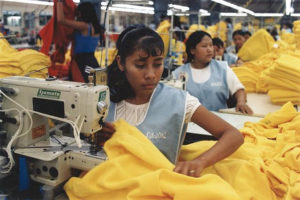
By marissaorton (Sweatshop project Uploaded by Gary Dee), via Wikimedia Commons
Today’s global supply chain creates economic opportunity overseas and cost savings for U.S. businesses, but comes with limited visibility and control of the working conditions where goods are sourced and manufactured. At a recent gathering sponsored by the Erb Institute, students explored supply chain sustainability in an effort to better prepare ourselves to address this issue as business professionals.
U-M students do not need to travel far to view an example of the domestic impact of global manufacturing. Our once booming “Motor City” now offers only a fraction of the manufacturing employment it once did, as automotive supply chains now source parts from around the world to assemble domestically under U.S. American logos. These practices raise many questions for both consumer and business: What exactly is ethical sourcing, how deep into supply chains are companies required to go and what tools are available to assess and implement supply chain sustainability efforts?
By practicing global sourcing, companies take on risk associated with the working conditions and broader governance context of their overseas suppliers, including labor and human rights issues, environmental standards and safety concerns. This reality, coupled with an increasingly curious and informed consumer public, forces businesses to look further along their supply chain than ever before. The tragic Rana Plaza collapse in Bangladesh captured the concern of the public and major clothing companies, from H&M to Walmart. The multinational corporation response to these incidents has varied. While some maintain a “we didn’t know, this is our suppliers’ responsibility” stance, others have delved into navigating this ambiguity and complexity with responsible sourcing initiatives and reinforced transparency efforts.
In response to accusations of poor working conditions of suppliers in China, Apple Senior Vice President of Operations Jeff Williams has committed to a collective engagement approach, stating, “We know there are a lot of issues out there, and our work is never done. We will not rest until every person in our supply chain is treated with the respect and dignity they deserve.”
Other companies have embraced a similar “we know there are issues, and we are trying” approach. Nike’s Responsibility site states: “We work with 744 contract factories employing nearly 1 million workers in 43 countries. When issues occur, we investigate, take immediate action and work with the contract factory to address the concern while working to improve processes.” Nike also openly acknowledges its challenges after being accused of child labor in the past: “In the early years we learned some tough lessons about operating a complex global supply chain. Since then we have been on a journey to understand the important role we can play in helping create an environment of collaboration and transparency.”
Of course, transparency is necessary but insufficient on its own. A variety of approaches — mandatory compliance, voluntary self reporting and legislation — are used to establish standards and collect information related to supply chain sustainability, for example:
- Apple and Nike expect suppliers to comply with their Codes of Conduct and invest significantly in auditing to assess practices against standards.
- Fiat Chrysler Automobiles led the automotive industry in developing a Sustainability Self Assessment tool, which is required of tier one suppliers and voluntary for sub-tier suppliers.
- Under the Dodd Frank Act Section 1502, known as the “Conflict Minerals Law,” companies filing with the U.S. Securities and Exchange Council are required to report on the sourcing of a certain group of minerals (tin, tantalum, tungsten and gold).
However, Dr. Richard Locke of MIT, a leading researcher on improving labor and environmental conditions in global supply chains, contends that these efforts are not enough. In his book The Promise and Limits of Private Power, Locke cites the shortcoming of “compliance model” efforts, in which standards are established, performance assessed and consequences imposed when standards are not met. In order to bring about the fundamental change needed and prevent an “us versus them” relationship, Locke proposes a “commitment model” between global buyers and suppliers, rooted in trust, information sharing, collaboration and an effort to address the root causes of these issues through capacity building training and support.
As Erb students move into the professional world, the topic of responsible sourcing is likely to arise regardless of role, industry or company. Achieving fundamental progress in supply chain sustainability will require the engagement of a wider community of stakeholders – from the picketers to the C-Suite – who embrace both transparency and a willingness to go beyond traditional approaches.